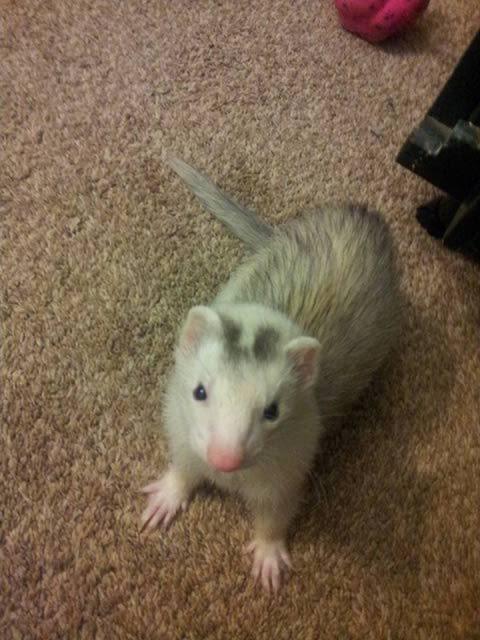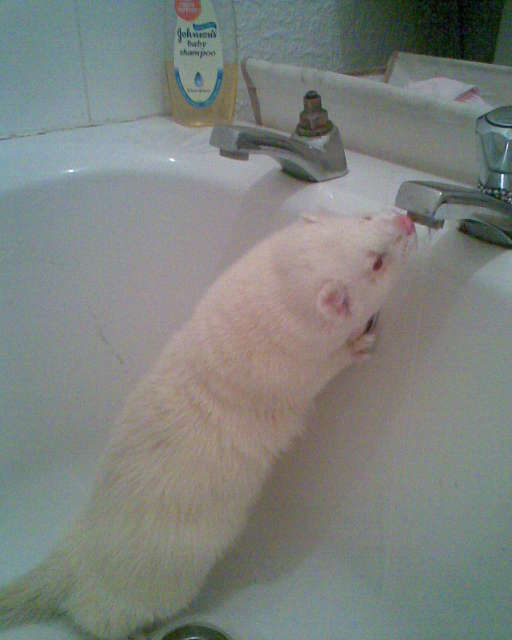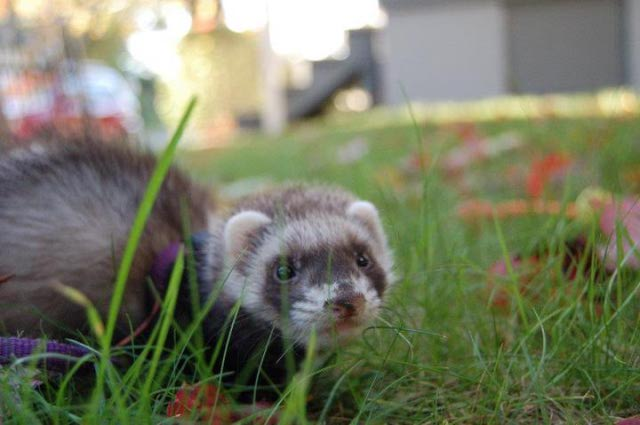QuestionMy husband and i just adopted our first ferret 2 days ago. We live in a small area and thought a ferret would be more happy here than say, a puppy. I have never been around ferrets before but i did do a lot of research. The papers on our fuzzie says she is about 2 months old which seems really young to me. She doesnt seem to like us! Im guessing it is because she is in a new invironment but when she is out of the cage she explores or bites our toes. She doesnt seem to have much interest in playing with us. Will she eventually come to love us and hang out with us? They require a LOT of maintenence and i would like the work to include some fun too.
Oh, and right now we have newspaper on the bottom level of her cage with bedding on top but the newspaper is really loud at night when shes roaming around. What is the best thing we can do w/ setting up her cage/bedding/litter and such so that shes happy and we can keep it as clean as possible? I want her to be comfy and like i said, i really have no experience with all of this! Thank you!
AnswerHi Marissa & Congratulations on your new baby!! You are just about to embark on a wonderful, joyous journey that will make you laugh like never before! Ferrets are awesome pets!
Your little girl sounds like a normal 'kit' (young ferret) - they have to search all around the perimemter of their surroundings and make sure where everything is before they can get down to the serious business of knowing they are safe and playing. Give her time and she will play.
One other important note - don't forget her distemper shots and her rabies shots. Since distemper is SO contagious that you can even bring it into your house on your shoes, please don't forget to get these. DO get a benadryl shot before each immunization AND never get a rabies and distemper shot at the same time. Stay at the vets for at least 20-30 mins after each shot to be sure she isn't going to have a reaction. She has had her first shot before she left the breeder, so she will need additional distemper shots at 12 and 16 weeks; then a rabies shot about two weeks later; then yearly boosters from then on.Hopefully you will get a good ferret vet will stay on top of this for you, but if you, ultimately you are responsible for your ferret's welfare.
It's very important during this time that the area you are allowing her in is 'ferretproofed' - all things removed that are dangerous to her. I'm sure if you did a lot of research, you already know that. If you don't, be sure to learn all you can about it because it will make the difference between a happy, well ferret and a dead or very sick ferret. Also be sure you know the symptoms of a sick ferret just in case you missed something and she happens to eat something she shouldn't and gets an intestinal blockage. I highly recommend the book FERRETS FOR DUMMIES by Kim Schilling - it covers all the basics that EVERY ferret parent, both new and old, need to know to keep their ferrets safe and happy.
Some ferrets are also more interractive than others. You may try something like Ferretone on your hands to get her to lick you and understand that you are not another ferret for her to bite on. Kits often don't have the understanding and think we're just large ferrets (who have very tough skin) so they can play hard. ALL ferrets love feet, shoes, socks - so you must keep shoes (especially those with foam rubber insoles) out of their reach! You can take some old socks and stuff them with a plastic medicine bottle with a few pieces of macaroni in it (so they can't get into it) and toss it around for her to play with - she will love the sock and the noise and it will help her know that you are just a big toy :-) Kits are sometimes difficult to interract with; which is why I usually recommend older ferrets for first time owners - they are just slower and easier to work with. With kits, you have to get their attention before you can do anything with them, but they can be a bundle of fun once you get it figured out. There is LOTS for you to read here:
http://www.ferretcentral.org and click on FAQs and just start reading. There is all kinds of information on that site, including a list of vets so you can be sure you are taking her to an exotics vet instead of a 'cat & dog' type vet (they usually just don't know the stuff they need to know for proper care of a ferret).
As far as the cage - it would be best for her if the litter BOX has either wood pellets (like you use in a wood stove), Yesterday's News compressed litter pellets, OR a regular (NOT clumping) litter in the litter box. Then place a poop in the box so she understands that's where it goes. Remove all food, water, and bedding from the litter area. Then make sure she has a little area for eating and drinking - I recommend both a water bottle AND a water dish underneath the bottle, but the water dish needs to be washed and refilled AT LEAST once a day (I have two ferrets and do theirs three times a day), and the water bottle needs to be emptied and cleaned with a very weak bleach solution, rinsed over and over and over until there is no bleachy smell left, then refill it. Food needs to be nearby in a dish. All ferrets seem to eat the big part of food, but leave little crumbs behind that they just won't touch - get used to it and when the dish contains mostly crumbs, just dump it, wash the bowl and refill with fresh food (preferrable a quality food like Totally Ferret or other high protein food specifically for ferrets. There is a chart to choose the best ferret foods here:
http://www.ohioferret.org/INFO/nutri_prn.asp
Ferrets are obligate carnivores, which means they should eat meat and kibble made of meat only - treats should also be meat, NOT fruits or vegetables or dried fruits or vegetables or any treat that has those products in them (BEWARE of Kaytee Fiesta! It is commonly referred to as "Blockage in a Bag" by experienced ferret owners because it is known for causing intestinal blockages). Be sure you know the symptoms of an intestinal blockage (this is part of the reading and learning you MUST do as a responsible ferret parent :-)
Her bedding should be soft fabric, NOT wood chips or similar. Ferrets LOVE your old pajamas, sweats, or get some little baby receiving blankets and/or fleece blankets for wintertime from a thrift store for very reasonable prices - there are a ton of beautiful and perfect ferret sleeping hammocks, cubes and tubes available on eBay. All summertime bedding should be lightweight. Ferrets MUST NOT be kept in temperatures over 82 degrees in summertime, so do be careful of that. Fans don't help ferrets, as they only work when they cause sweat evaporation from the skin and ferrets don't sweat. So, you must keep the temperature under 82 degrees OR keep the ferret wet and a fan on it; OR keep wet sheets on the cage and a fan aimed at it so the evaporating water keeps the ferret's area cool. If a ferret starts panting, it is an emergency and you MUST cool the ferret down immediately - put her in lukewarm water, so as not to shock her, offer her a cool drink and get near a fan while she is drying - then get her to a cooler place.
If you just remember to keep the eating, sleeping and litter areas separate in the cage, you really can't go wrong. Stick a few *safe* (no rubber or small parts that will come off like noses, etc - just like you would for a very young child), things that make noise like hard balls with bells in them, teddy bears that make noise when touched - that kind of stuff - in the cage. Kits have a LOT of energy and need a MINIMUM of three hours out of the cage daily and must be SUPERVISED during this time. You will soon become your ferret's favorite toy! :-)
I strongly encourage you to read all you can on Ferret.org and to get the book FERRETS FOR DUMMIES and read it cover to cover - your ferret will live a longer, happier life for it. Best of luck and don't forget the Ferretone (an oil in a brown bottle at the pet store that ferrets LOVE) on your hands when playing with her these early days - she will understand that hands are *good* things in no time at all. She *may* always bite feet......ferrets are famous for that and shoes, so be sure all shoes are up and out of her reach. Read a LOT, and have a LOT of FUN - your ferret is depending on YOU to keep her safe and her environment SAFE to play in!
Sincerely,
Jacquie Rodgers

 ferret loneliness
Question
Mostar
I am a new owner of a single fer
ferret loneliness
Question
Mostar
I am a new owner of a single fer
 ferret love
Question
snert
hi my name is john from england i had to
ferret love
Question
snert
hi my name is john from england i had to
 Ferret itching a lot
Question
brad-lees hair loss
I have a 4 year old ferret
Ferret itching a lot
Question
brad-lees hair loss
I have a 4 year old ferret
 Maggots found in ferret cage?!
Question
Cloud and Bandit
So i have had my femal
Maggots found in ferret cage?!
Question
Cloud and Bandit
So i have had my femal
 Choosing A Second Ferret.....Vaccine Information
Question
Sirius Black
My lil guy Sirius is one y
Choosing A Second Ferret.....Vaccine Information
Question
Sirius Black
My lil guy Sirius is one y